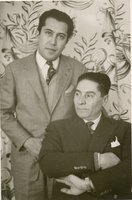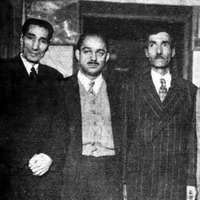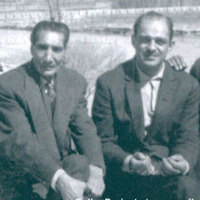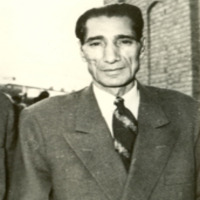Adib Khwunsari
(1901-1983)Adib Khvansari, Isma‘il (1901-1983). Vocalist and one of the most eminent performers of classical Persian singing (avaz) in the twentieth century. He studied in Isfahan and Tehran with the most outstanding masters of avaz (among whom were ‘Andalib Gulpayigani and Sayyid Rahim) and with maestros of Persian classical music such as Musa Ma‘rufi and Murtaza Mahjubi. He recorded gramophone records of his vocal performances in the years 1925-1950 and was one of the first vocalists performing on Radio Tehran (established in 1940). He gradually ceased to perform in the public from early 1950s onwards, solely performing as a vocalist at private artistic circles and for friends.
The establishment of the Gulha in 1955 was thus the best opportunity for the talent of traditional and veteran musicians like Adib to reblossom. His generation had at that time withdrawn themselves from the public sphere, with no trace of their great art left recorded. Even today, owing to factors unbeknownst, very few of his works are available that adequately reflect the zenith of his vocal artistry. Among his memorable performances are Barg-i Sabz no. 36 in which the nineteen-year-old music prodigy Parviz Yahaqqi accompanies him on the violin while Adib uses lines from Sa‘di (opening with: Husn-i tu da’im bar in qarar namanad “Your beauty will not last long”) in the musical mode of Shur accompanied by Jalil Shahnaz’s solo performance on the tar. Adib’s daughter, Dr. Shirin Adib, released eight CD albums featuring his performances throughout his career. She also published a book on his life and works titled Adib Khvansari: Ava-yi Javidan dar Musiqi-yi Iran (Adib Khvansari, an Everlasting Voice in Persian Music, Tehran 1385/2007). He was the most eminent classical vocalist of his generation and Ghulam Husayn Banan was profoundly influenced by his vocal style. Although he only performed in a few of the Gulha programs, he was influential in advising Pirnia in artistic matters and in instructing the vocalists performing in the Gulha.





 In association with The Iran Heritage Foundation © All rights reserved 2025. Jane Lewisohn | Website by
In association with The Iran Heritage Foundation © All rights reserved 2025. Jane Lewisohn | Website by